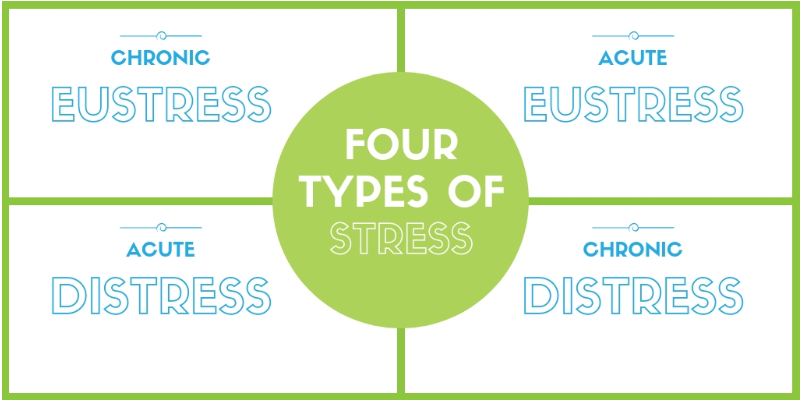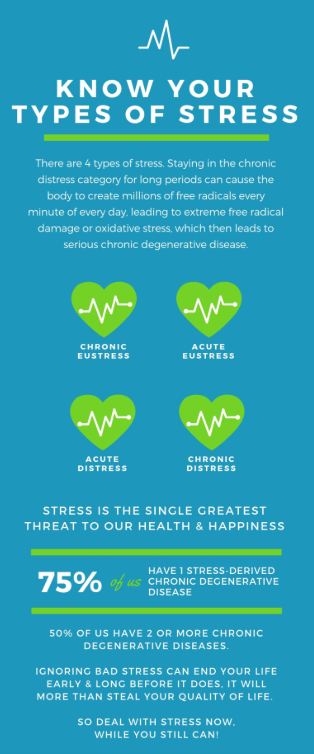Stress
Four Types of Stress to Know & Understand
To cope well with stress, you need to understand the four types of stress. By understanding the four types of stress, we can much more easily avoid becoming victims of the effects of stress. The “Four Quadrant Stress Grid” below explains the four types of stress fairly simply.
Staying in any of the four zones for long periods can cause the body to create millions of free radicals. This over-production of free oxygen radicals by the body usually leads to plenty of free radical damage or oxidative stress, which then leads to serious chronic degenerative disease (CDDs).
Thousands of medical doctors now believe oxidative stress to be the core cause of more than 200 known CDD’s. On a quick side note, when it comes to chronic disease, about half are inflammatory diseases and the other half are auto-immune diseases.
Definitions for the 4 Main Types of Stress
Chronic
- adjective: being long-lasting and recurrent or characterized by long suffering (“Chronic indigestion”)
- adjective: having a habit of long standing (“A chronic smoker”)
Acute
- having or experiencing a rapid onset and short but severe course (“Acute appendicitis”)
- adjective: extremely sharp or intense (“Acute pain”)
Eustress (Good Stress as in Euphoric Stress)
- stress that is deemed healthful or giving one the feeling of fulfillment
- the optimal state of stress to be the most productive
Distress (Bad Stress or Destructive Stress)
- great pain, anxiety, or sorrow; acute physical or mental suffering; affliction; trouble.
- a state of extreme necessity or misfortune.

Types of Stress Quadrant One: Chronic Eustress
Quadrant One is Chronic Eustress or long lasting, recurrent, good stress. This is, by far, the best of the types of stress out there. This is when the body can be in its most productive state.
This quadrant should be every person’s goal in life. While it is an excellent goal to stay in this quadrant as much as possible, the body also needs downtime from all types of stress. Be creative, be aggressive and be consistent because this is the quadrant where “real” productivity exists. However, be sure to build in significant amounts of rest and relaxation.
Don’t get me wrong, if things happen in life, that take you out of this quadrant for a time, it’s more than OK. Just do your best to deal with the problem and move back to this safer quadrant as soon as possible. Even here, the body will make many free radicals, so we still need effective stress management always.
Choosing Positive
Emotions like fun, happiness, success, peace, joy, laughter, fulfillment, spirit and love exist in this quadrant. When we are in a state of chronic eustress, our bodies have very high levels of the feel-good hormones and neurotransmitters like Dopamine, Endorphin, Serotonin, Nitric Oxide, DHEA, BDNF, and Oxytocin. These brain and body chemicals make it possible for us to have high levels of self-esteem and to have really strong relationships in all areas of your life.
When the shiny newness of marriages or long-term relationships starts to wear off, all a couple must do is get into this quadrant again and it will feel like the honeymoon phase all over again.
However, relationships are just one challenging area of life assisted by an awareness of the four types of stress. By understanding all the different types of stress as well as the 4 main fields of stress, we can all keep our bodies in the optimal state of stress or non-stress in all areas of life and we can do it by design.
Types of Stress Quadrant Two: Acute Eustress
Quadrant Two is Acute Eustress or rapid onset, short, intense good stress. On a ‘types of stress’ scale of 1-10, with 1 being bad and 10 being good, this quadrant sits at about 6-7.
Feeling Great and Loving It!
When you get some really great news or you have an awesome workout or when something wonderful happens to you, you experience this kind of stress. In these times, the human stress response system temporarily floods the body with feel good hormones like Dopamine and Oxytocin.
Of the four types of stress, this type is desirable, and it does a body good to experience acute eustress often.
Types of Stress Quadrant Three: Acute Distress
Quadrant Three is Acute Distress or rapid onset, short, intense bad stress. As far as types of stress go, this one is no fun but is not terribly dangerous and in fact it can save your life.
Of the four types of stress, this one is the most respectful of your body’s built in stress response system. This type of stress response happens when we feel shocked or threatened and your fight or flight stress response system kicks into gear.
The HPA Axis in the body sends out a flood of emergency response hormones such as Adrenaline and Cortisol. These hormones allow us to be alert, to have increased strength, endurance, speed and energy, thereby allowing us to respond to danger.
Survival Realities
This type of stress happens is serious situations like car accident or if you feel extreme fear. While this type of stress can be thought of as bad stress, it is not dangerous in the long term, assuming it is not over-used, because it does not last a long time, and the body will wash away these extra hormones when the danger or threat has passed.
We need this part of the human stress response system. It’s what helps us survive. What we don’t need is the residual Cortisol hormone that gets left behind after the stressor is over. Thankfully, there is a simple solution to this problem. If you follow this acute stress response up with cardio exercise, you can eliminate most of the Cortisol. However, it’s not a great idea to expose yourself to acute stressors often. The human body does not like being threatened constantly or repeatedly.
Types of Stress Quadrant Four: Chronic Distress
Quadrant Four is Chronic Distress or long lasting, recurrent bad stress. This is by far the worst of the types of stress in our lives. Unfortunately, it is also the most common. When this situation goes unchecked, the body produces extreme free radicals leading to plenty of oxidative stress.
Chronic distress is the cause of most people’s problems. This quadrant leads to the constant flooding of the body with emergency response hormones like Cortisol and Adrenaline. When we misuse the Endocrine System this way, things easily begin to malfunction.
It’s just like the Pancreas. The Pancreas easily wears out from constant over use when we spike our blood sugar levels several times each day. The Pancreas can’t process that much sugar all the time and the Endocrine System can’t process that much hormonal activity all the time.
When we stay in a state of chronic distress all the time, we overproduce the emergency response hormones, and we under-produce the feel-good hormones.

Time for Serious Changes
Every effort should be made to get out and stay out of this zone at all costs. Do whatever you have to do. Change your expectations, change your job, get out of a bad relationship, ask for help, pray to a higher power if you need to, but get out of this quadrant NOW! As far as types of stress go, this quadrant is a non-starter on every level.
If you stay here for long, you will get sick. You can develop Panic Attacks, Anxiety, Depression, Chronic Fatigue Syndrome, and a whole host of other illnesses. Oh, and by the way – you will very likely gain a lot of weight and get very fat, too. All these diseases and problems come from a messed up HPA Axis in the body. It’s just the same as Diabetes and Metabolic Syndrome come from a messed-up Pancreas.
Staying here will kill you sooner that you might like. However, long before this quadrant gets around to that, it will more than steal your quality of life. So, get out now, while you still can and stay out.
11 healthy ways to handle life’s stressors
Try to eliminate the stressors
Whether or not you experience an intolerable level of psychological stress depends on the intensity of the situation and also the person experiencing it. How you perceive and think about a stressor can also make a big impact on how you respond. It’s not always possible to escape a stressful situation or avoid a problem, but you can try to reduce the stress you are feeling. Evaluate whether you can change the situation that is causing you stress, perhaps by dropping some responsibility, relaxing your standards, or asking for help.
Cultivate social support
Strong social support can improve resilience to stress. Reach out strategically. Some friends or family members may be good at listening and sympathizing. Others might excel at practical help, like bringing over a home-cooked meal or covering an hour of child care. Giving support can also increase positive emotions and decrease negative emotions. Just make sure your relationships stay in balance. A friend who requires support but never gives it may increase your stress level.
Seek good nutrition
When confronted with a stressor, the central nervous system releases adrenaline and cortisol, which affects the digestive tract among other physiological changes. Acute stress can kill the appetite, but the release of the hormone cortisol during chronic stress can cause fat and sugar cravings. Research also suggests that high cortisol combined with high sugar consumption may prompt the deposition of fat around our internal organs—visceral fat that is associated with cardiovascular and metabolic diseases. A diet high in a variety of nutrients can both protect health and provide more physical energy to deal with challenges. No need to go vegan or swear off cookies—just aim to consume a rainbow of fruits and vegetables as part of your daily diet. Avoid using substances such as alcohol to dampen the stress response since substances do not solve the root of the problem and can have serious health effects.
Relax your muscles
Because stress causes muscles to tense, being stressed out can create tension headaches, backaches, and general fatigue. Combat stress and these symptoms with stretches, massage, or warm baths. Or try progressive muscle relaxation, a method that has been shown to reduce anxiety and improve overall mental health. To practice progressive muscle relaxation, get in a comfortable position and choose a muscle group, like your lower leg muscles (most practitioners recommend starting with the lower body and working your way up). Inhale and contract the muscles for five to 10 seconds, then exhale and release the muscles suddenly. Relax for 10 or more seconds and then move on to the next muscle group. Another option is passive progressive muscle relaxation. This technique is similar to progressive muscle relaxation but skips the tensing step. Instead, simply picture each muscle group one at a time and focus on relaxing that portion of the body.
Meditate
A strong body of research shows that mindful meditation can reduce psychological stress and anxiety—even short-term mindfulness meditation programs work. To get started, set aside five minutes in a quiet place to sit and breathe. Focus on the present moment; if stray thoughts intrude, acknowledge them and then let them go. Don’t judge yourself for any mental wavering. Gently refocus and bring the attention back to the present moment.
Protect your sleep
Daytime stress affects nighttime sleep. Making matters worse, losing shuteye can affect both cognition and mood. How to sleep better? Try to have a consistent sleep routine that allows time to wind down before lights out. Meditation and relaxation can help with insomnia. Also, avoid caffeine and alcohol in the late afternoon and evening. Put down your screens, as blue light can suppress the sleepy hormone melatonin (and checking social media may ramp up your emotions.) Finally, move your body during the day: A large body of research suggests that physical activity can improve sleep, especially for middle-aged and older adults.
Get physical
Brisk movement can not only improve sleep, but it can also directly combat stress. In one study, working adults who participated in moderate physical activity had half the perceived stress as working adults who did not participate. Physical activity may also cancel out some of the negative effects of stress, including the impact of stress on the immune system. Adding physical activity needn’t be expensive or complex: A brisk 30-minute walk or a dance session in the living room can do the trick.
Take a moment in nature
Studies conducted in multiple countries have found that green space improves mood. Even nature videos can speed the recovery from stress compared with videos of urban scenes. Taking a moment to notice nature—even in the form of a bustling city park—can refocus and calm your mind.
Keep your pleasurable activities
When life gets overwhelming, people often drop their leisure activities first. But cutting yourself off from pleasure can be counterproductive. Even when time is tight, look for opportunities to do something for yourself, whether that means reading a novel, singing along to your favorite tunes, or streaming your favorite comedy on Netflix. Humor and laughter can benefit both mental and physical health.
Reframe your thinking
One of the most research-supported treatments for stress and anxiety is cognitive behavioral therapy, or CBT. At the root of this therapy approach is the understanding that our thoughts influence our emotions, which in turn influence our behaviors. Reframing your thoughts around a stressor can help manage your emotions, reducing feelings of stress. Some tips: If you feel yourself spiraling into imagining worst-case scenarios, stop and put your mind elsewhere. Set realistic expectations for yourself. Strive for acceptance of situations outside of your control.
Seek Help: If you feel overwhelmed and self-help isn’t helping, look for a psychologist or other mental health provider who can help you learn how to manage your stress effectively. He or she can help you identify situations or behaviors that contribute to your stress and then develop an action plan to change the stressors, change your environment, and change your responses.
All information obtained on this page is from Stress Relief Measures.
